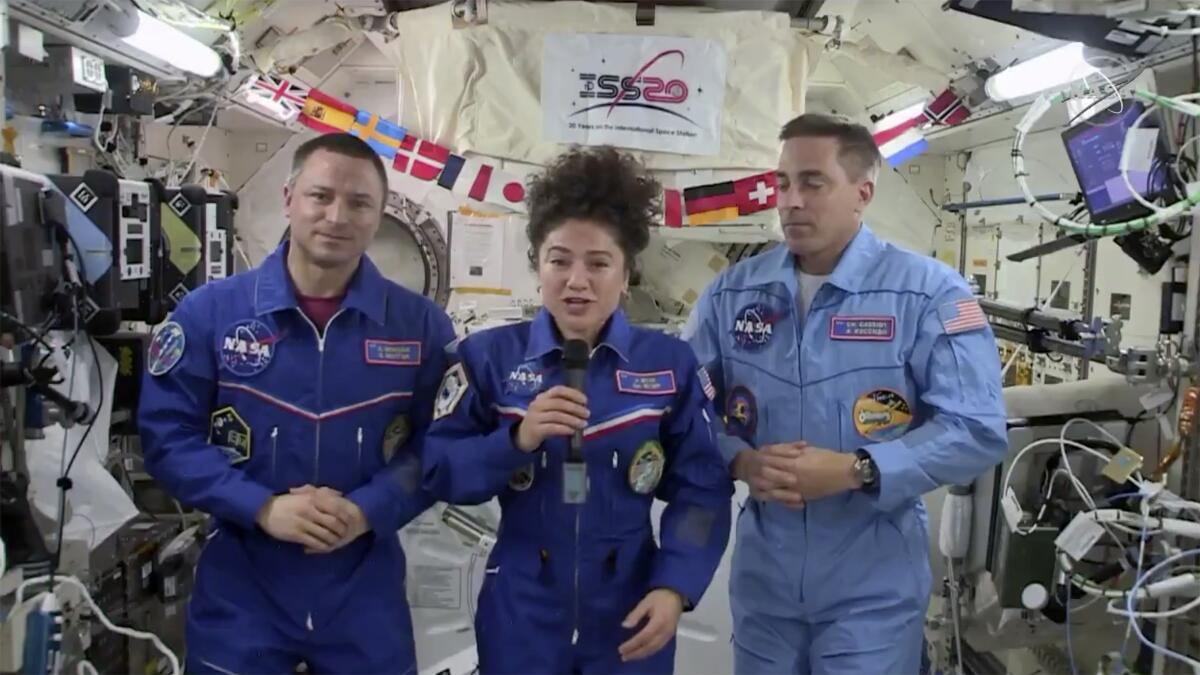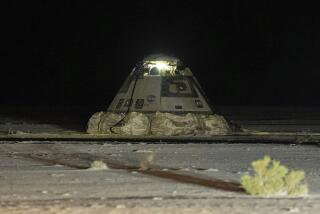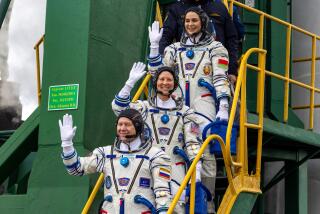Space station crew returns to a changed Earth after more than 200 days in orbit

- Share via
MOSCOW — A U.S.-Russian space crew landed safely Friday in the steppes of Kazakhstan, greeted with extra safety precautions brought on by a pandemic that didn’t exist when they left the Earth.
Following a stint on the International Space Station, NASA astronauts Jessica Meir and Andrew Morgan and Russian Oleg Skripochka touched down as scheduled at 11:16 a.m. (0516 GMT) Friday. Their Soyuz landing capsule landed under a striped orange-and-white parachute about 93 miles southeast of Dzhezkazgan in central Kazakhstan.
Russian officials said they took stringent measures to protect the crew amid the COVID-19 pandemic. The recovery team and medical personnel assigned to help the crew out of the capsule and for post-flight checks had been under close medical observation for nearly a month, including tests for the coronavirus.
The space crew smiled as they talked to medical experts wearing masks. Following a quick checkup, the crew will be flown by helicopters to Baikonur, from where Skripochka will be taken to Moscow, said Vyacheslav Rogozhnikov, a Russian medical official who oversaw the crew’s return.
Morgan and Meir will need to be driven from Baikonur to Kyzyl-Orda, nearly 200 miles away, to board a flight back to the U.S. — a strenuous journey made necessary by Kazakhstan’s quarantine measures.
On Thursday, the Russian government coronavirus headquarters reported the first outbreak at the Star City, which serves as the main hub for pre-flight training of U.S., Russian and other international crew members of the International Space Station. The Star City also has residential quarters for cosmonauts and support staff.
Roscosmos Director Dmitry Rogozin said Wednesday that the Russian space corporation had 30 coronavirus cases.
The crew returned to Earth exactly 50 years after the Apollo 13 astronauts splashed down in the Pacific after an oxygen tank explosion aborted the moon-landing mission.
Innovations are taking place around the country as doctors and entrepreneurs turn their ingenuity to solving the country’s ventilator shortage.
Morgan wrapped up a 272-day mission on his first flight into space. He conducted seven spacewalks, four of which were to improve and extend the life of the station’s Alpha Magnetic Spectrometer, which looks for evidence of dark matter in the universe.
Meir and Skripochka spent 205 days in space, with Meir carrying out the first three all-female spacewalks with her crewmate Christina Koch, who returned from space in February.
As NASA astronauts Christina Koch and Jessica Meir emerged, it marked the first time that a woman space-walked without a male crew mate.
Speaking from the orbiting outpost before the return to Earth, the crew said that coming back to a world drastically changed by the pandemic will be challenging. Morgan said the crew has tried to keep atop the coronavirus news, but added that it’s hard to comprehend what’s really going on.
“It is quite surreal for us to see this whole situation unfolding on the planet below,” said Meir. “We can tell you that the Earth still looks just as stunning as always from up here, so it’s difficult to believe all the changes that have taken place since both of us have been up here.”
A new crew comprising NASA’s Chris Cassidy and Russians Anatoly Ivanishin and Ivan Vagner arrived at the station April 9. They said before blastoff that they had been under a very strict quarantine for a month before the flight and were feeling good.
More to Read
Sign up for Essential California
The most important California stories and recommendations in your inbox every morning.
You may occasionally receive promotional content from the Los Angeles Times.










